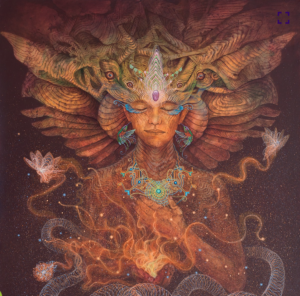That is the terrible ego. The dangerous ego. The much deprecated ego.
Which is a pity, because in its simplest form the ego is simply the self. Although the ego is not simple at all, and its multidimensionality is delightful,
has both trustworthy and despicable parts.

It extends to a multitude of states, some of which we are directly aware of, some of which we are indirectly aware of (the subconscious), and some of which we cannot comprehend with our limited minds (the unconscious and superconscious). The rabbit hole goes deep, but the uninitiated ego does not realise that the rabbit hole is the self.
Basically, an uninitiated ego is an ego that is not aware of itself as an individualised, self-realising force in an interdependent cosmos. While the initiated ego is aware of itself as an individualised, self-realising force in an interdependent cosmos.
Of course, no ego is ever completely uninitiated or self-initiated. Just as no ego is ever completely individuated or self-realised. Everything is on a spectrum of possibilities and potentials in response to action or lack thereof, including self-development.
Ultimately, the ego is a spectrum, and the potential to become initiated or remain uninitiated is a matter of motivation, imagination and action. It takes a lot of work to unlearn what we have learned.
There are three main obstacles on the path from the uninitiated to the initiated ego.Trap No. 1) Taking things too personally.Trap No. 2.) Taking things too literally.Trap #3.) Taking things too seriously
Passing these hurdles does not necessarily guarantee successful initiation, but in order to achieve it at all, one must pass through these three points at some point. Let us take a look at them.
Trap No. 1: Taking things too personally.
“One man’s magic is another man’s engineering.”
~ Robert A. Heinlein
While the initiate frees himself within the ‘stories told’, the uninitiated remains entangled in the ‘story told’.
In simple terms, our sense of self is the story we tell about ourselves. But most of us uninitiated egos don’t even realise that It is we who create these stories. When we are unaware that in telling, we are creating a story about our self, there is a tendency to take things too personally.
Our ego gets offended in every situation. We feel wronged by fate and humiliated by the pettiness of others. We feel offended by the actions of others, even when the “others” are not even acting against us.
This is because the uninitiated ego tends to be codependent and is usually brought up in a state of codependency. The most common theme of codependency is an over-reliance on the approval of others and their perception of our identity.
The tendency to take things too personally exists because a sense of identity is linked to the approval of others. There is also a tendency to be dismissive of fate rather than taking responsibility for reprogramming one’s conditioning.
But as Carl Jung said:
“Until you make the unconscious conscious, it will run your life and you will call it destiny.
An effective way of not taking things too personally can be to free yourself to tell your own story, rather than getting caught up in it. It’s like the difference between ordinary dreaming and conscious dreaming. In ordinary dreaming, we are puppets of fate: even our emotions are threatened and we cannot improve our disposition. But in conscious dreaming we have power over our faculties, and our emotional disposition is under our control. We control our fate by controlling our reactions to our fate.

Similarly, the initiated ego telling a story about itself is like the consciousness of the dreamer, while the uninitiated ego is so caught up in being a victim of the dream state that it has no possibility of being conscious of its own power. The initiated ego is to the conscious dreamer the same as the uninitiated ego is to the dreamer without conscious dreaming.
Where the dreamer unconsciously takes the dream personally and reacts emotionally, playing the victim, the dreamer consciously takes the dream as it is and reacts courageously, taking the lead role.
So it is in waking life with the initiated versus the uninitiated ego. The initiated ego emits its own frequency in an engaging way, thus imprinting its intention in the universe; while the uninitiated ego involuntarily absorbs the surrounding frequencies, thus being imprinted by the universe.
Trap 2: Taking things too literally
“If the doors of perception were cleared, everything would appear to man as it is, Infinite”.~ William Blake
Just as the uninitiated ego loves to play the victim, it also loves to play the obedient servant. Instead of taking things figuratively and using their imagination, those with uninitiated egos prefer to take things literally and let someone else think for them.
They would rather not go through the sometimes arduous task of challenging the status quo. Instead of following their wisdom, people with uninitiated egos would rather put all their eggs in one or two baskets and then take those baskets as literal truth.
Taking things too literally and abandoning imagination is dangerous because it leads to closed-mindedness and extremism. It limits inspiration. It stops progress. It murders metaphor and kills the symbolic, reducing the beautiful multicoloured universe to a black and white cliché.
The mind’s eye closes when the uninitiated ego decides to take things too literally. Ingenuity and the capacity for invention are weakened by the shackles of accuracy.
Better to be vague and open-minded than precise and closed-minded. Better to be uncertain and flexible than certain and dogmatic. Better to be indeterminate and flexible than definite and fixed. The initiated ego knows this to be true.

The uninitiated ego fights against this truth, in its futile attempts to pigeonhole the infinite into a tiny, egocentric, human-centred box. Better to let reality be infinite and try to grow out of that box, to flourish despite the finiteness, than to wallow in the literalness of the box. Indeed, reality is too important to take literally.
Trap 3: Taking things too seriously
“Life is too important to be taken seriously.”
~Oskar Wilde
This is the biggest trap of them all, because it is so easy to take things too seriously. It is so easy to reduce a cosmic joke to an egocentric tragedy.
And the uninitiated ego above all wants to take itself seriously. It props itself up in the safety of its own comfort zone, taking its own security too seriously. It wanders steadfastly into insecurity, not realising that innocence is courage.
As Brene Brown puts it:
“You can have courage or you can have comfort, but you can’t have both.
The uninitiated ego wallows in self-seriousness, crushed by the weight of an unforgiving universe, not realising that all it has to do is: let go! Laugh. Make fun of pettiness. Punch holes in all the ideals that are important to him. This will burst the growing bubble of an agitated ego.

The initiated ego develops strategies for letting go: humour, holy laughter and non-attachment. Where the uninitiated ego sinks into the boredom and nihilism that inevitably overflows from the overflowing cup of seriousness, the initiated ego howls with joy and existential masochism, filling the cup only so much and then emptying it, again and again.
The initiated ego is counterintuitively larger than the uninitiated ego, but it is healthier because it stretches its own comfort zone. It is healthier precisely because it does not take itself too seriously.
In doing so, he moves from being a small ego trapped in a small comfort zone, to being a large, initiated ego, liberated in interdependence with all things. It becomes a part and expression of the force of nature.
From ‘sacrificing the world’ to ‘becoming the world’. From the flattering marauder to the transcendent sage. From self-serious littleness to flourishing self-overcoming.
The path from the ego of the uninitiated to the ego of the initiated is not easy, but, as Spinoza pronounced:
“Everything perfect is as difficult as it is rare”.
Let us know where you are on your path to initiation 🙂
Source:
POLSKI
Pułapki niewtajemniczonego ego
Oto straszne ego. Niebezpieczne ego. Tak bardzo deprecjonowane ego.
A szkoda, bo w swojej najprostszej formie ego jest po prostu jaźnią. Mimo, że jaźń wcale nie jest prosta, a jej wielowymiarowość zachwyca,
ma części zarówno godne zaufania, jak i nikczemne.

Rozciąga się na mnóstwo stanów, niektórych z nich jesteśmy bezpośrednio świadomi, niektórych jesteśmy pośrednio świadomi (podświadomość), a jeszcze innych nie możemy pojąć ograniczonym umysłem (nieświadomość i nadświadomość). Królicza nora sięga głęboko, lecz niewtajemniczone ego nie zdaje sobie sprawy, że króliczą norą jest jaźń.
Zasadniczo niewtajemniczone ego to ego, które nie jest świadome siebie jako zindywidualizowanej, samorealizującej się siły we współzależnym kosmosie. Podczas gdy wtajemniczone ego jest świadome siebie jako zindywidualizowanej, samorealizującej się siły we współzależnym kosmosie.
Oczywiście żadne ego nie jest nigdy całkowicie niewtajemniczone ani wtajemniczone. Tak jak żadne ego nigdy nie jest całkowicie zindywidualizowane, ani samo-zrealizowane. Wszystko znajduje się w spektrum możliwości i potencjałów w odpowiedzi na działanie lub jego brak, włączając w nie samorozwój.
W ostatecznym rozrachunku ego jest spektrum, a potencjał wtajemniczenia lub pozostania niewtajemniczonym jest kwestią motywacji, wyobraźni i działania. Trzeba wykonać wiele pracy, by oduczyć się tego, czego się nauczyliśmy.
Na drodze od niewtajemniczonego do wtajemniczonego ego znajdują się trzy główne przeszkody.
Pułapka nr 1.) Branie rzeczy zbyt osobiście.
Pułapka nr 2.) Traktowanie rzeczy zbyt dosłownie
Pułapka nr 3.) Traktowanie rzeczy zbyt poważnie
Przejście przez te przeszkody niekoniecznie gwarantuje pomyślne wtajemniczenie, ale aby je w ogóle osiągnąć, trzeba w pewnym momencie przejść przez te trzy punkty. Przyjrzyjmy się im.
Pułapka nr 1: Branie rzeczy zbyt osobiście.
„Magia jednego człowieka to inżynieria drugiego”.
~ Robert A. Heinlein
Podczas gdy wtajemniczony uwalnia się w ramach „opowiadanych historii”, niewtajemniczony pozostaje uwikłany w „opowiadanej historii”.
W uproszczeniu, nasze poczucie siebie jest historią, którą o sobie opowiadamy. Ale większość z nas, niewtajemniczonych ego, nawet nie zdaje sobie sprawy, że to my tworzymy te historie. Kiedy nie jesteśmy świadomi, że opowiadając, tworzymy historię o swojej jaźni, powstaje tendencja do brania rzeczy zbyt osobiście.
Nasze ego obraża się w każdej sytuacji. Czujemy się skrzywdzeni przez los i poniżani przez małostkowość innych. Czujemy się urażeni działaniami innych, nawet jeśli “inni” nawet nie działają przeciwko nam.
Dzieje się tak, ponieważ niewtajemniczone ego ma tendencję do współuzależnienia i zazwyczaj jest wychowywane w stanie współuzależnienia. Najczęstszym tematem współzależności jest nadmierne poleganie na aprobacie innych i ich percepcji naszej tożsamości.
Tendencja do przyjmowania rzeczy zbyt osobiście istnieje, ponieważ poczucie tożsamości jest związane z aprobatą innych. Istnieje również tendencja do bycia lekceważonym przez los zamiast brania odpowiedzialności za przeprogramowanie własnego uwarunkowania.
Ale jak mówił Carl Jung:
„Dopóki nie uczynisz nieświadomego świadomym, będzie ono kierować twoim życiem i będziesz nazywać je przeznaczeniem”.
Skuteczną metodą na to, aby nie brać rzeczy zbyt do siebie, może być uwolnienie się od opowiadania własnej historii, zamiast wikłania się w nią. To jak różnica między zwykłym snem, a świadomym śnieniem. W zwykłym śnie jesteśmy marionetkami losu: nawet nasze emocje są zagrożone i nie możemy poprawić naszego usposobienia. Ale w świadomym śnie mamy władzę nad naszymi zdolnościami, a usposobienie emocjonalne jest pod naszą kontrolą. Kontrolujemy nasz los poprzez kontrolę reakcji na nasz los.

Podobnie, wtajemniczone ego opowiadające historię o sobie jest niczym świadomość śniącego snu, podczas gdy niewtajemniczone ego jest tak uwikłane w bycie ofiarą stanu snu, że nie ma możliwości być świadomym swojej własnej mocy. Wtajemniczone ego jest dla świadomego śniącego tym samym, co niewtajemniczone ego dla śniącego bez świadomego śnienia.
Tam, gdzie śniący nieświadomie przyjmuje sen osobiście i reaguje emocjonalnie, grając ofiarę, śniący świadomie przyjmuje sen takim, jakim jest i reaguje odważnie, przyjmując główną rolę.
Tak jest w życiu na jawie z wtajemniczonym kontra niewtajemniczonym ego. Wtajemniczone ego w ujmujący sposób emituje swoją własną częstotliwość, odciskając w ten sposób swoją intencję we wszechświecie; podczas gdy niewtajemniczone ego bezwiednie pochłania otaczające je częstotliwości, w ten sposób jest odciskane przez wszechświat.
Pułapka nr 2: Traktowanie rzeczy zbyt dosłownie
„Gdyby drzwi percepcji zostały oczyszczone, wszystko wydałoby się człowiekowi takie, jakie jest, Nieskończone”.
~ William Blake
Tak jak niewtajemniczone ego uwielbia odgrywać ofiarę, tak samo uwielbia odgrywać posłusznego sługę. Zamiast brać rzeczy w przenośni i używać swojej wyobraźni, ci z niewtajemniczonym ego wolą brać rzeczy dosłownie i pozwolić komuś innemu myśleć za nich.
Woleliby raczej nie przechodzić przez czasami żmudne zadanie kwestionowania statusu quo. Zamiast podążać za swoją mądrością, ludzie z niewtajemniczonym ego woleliby włożyć wszystkie swoje jajka do jednego lub dwóch koszyków, a następnie wziąć te koszyki jako dosłowną prawdę.
Traktowanie rzeczy zbyt dosłownie i porzucanie wyobraźni jest niebezpieczne, ponieważ prowadzi do zamknięcia umysłu i ekstremizmu. Ogranicza inspirację. Zatrzymuje postęp. Morduje metaforę i zabija symboliczne, sprowadzając piękny wielokolorowy wszechświat do czarno-białej kliszy.
Oko umysłu zamyka się, gdy niewtajemniczone ego postanawia traktować rzeczy zbyt dosłownie. Pomysłowość i zdolności inwencji zostają osłabione przez kajdany dokładności.
Lepiej być niejasnym i otwartym, niż dokładnym i zamkniętym. Lepiej być niepewnym i elastycznym, niż pewnym i dogmatycznym. Lepiej być nieokreślonym i elastycznym, niż określonym i ustalonym. Wtajemniczone ego wie, że to prawda.

Niewtajemniczone ego walczy z tą prawdą, w swoich daremnych próbach zaszufladkowania nieskończoności do malutkiego, egocentrycznego, skoncentrowanego na człowieku pudełeczka. Lepiej pozwolić rzeczywistości, aby była nieskończona i spróbować wyrosnąć z tego pudełka, rozkwitnąć pomimo skończoności, niż tarzać się w dosłowności pudełka. W rzeczy samej, rzeczywistość jest zbyt ważna, by traktować ją dosłownie.
Pułapka nr 3: Traktowanie rzeczy zbyt poważnie
„Życie jest zbyt ważne, aby traktować je poważnie”.
~Oskar Wilde
To największa pułapka z nich wszystkich, ponieważ tak łatwo jest traktować sprawy zbyt poważnie. Tak łatwo jest sprowadzić kosmiczny żart do egocentrycznej tragedii.
A niewtajemniczone ego przede wszystkim pragnie traktować siebie poważnie. Podpiera się w bezpiecznej strefie własnego komfortu, zbyt poważnie traktując własne bezpieczeństwo. Wędruje niezłomnie na niepewnym etapie, nie zdając sobie sprawy, że niewinność jest odwagą.
Jak mówi Brene Brown:
„Możesz mieć odwagę lub możesz mieć komfort, ale nie możesz mieć obu”.
Niewtajemniczone ego brnie w samopoważności, miażdżone ciężarem bezlitosnego wszechświata, nie zdając sobie sprawy, że wszystko, co musi zrobić, to: puścić! Uśmiać się. Zażartować z małostkowości. Wbijać dziury we wszystkie ważne dla siebie ideały. To rozbije rosnącą bańkę wzburzonego ego.

Zainicjowane ego rozwija strategie odpuszczania: humor, święty śmiech i brak przywiązania. Tam, gdzie niewtajemniczone ego pogrąża się w nudzie i nihilizmie, które nieuchronnie przelewają się z przepełnionego kubka powagi, wtajemniczone ego wyje z radości i egzystencjalnego masochizmu, napełniając kubek tylko tak bardzo, a następnie opróżniając go, raz za razem.
Wtajemniczone ego jest wbrew pozorom większe niż ego niewtajemniczone, ale dzięki temu jest zdrowsze, ponieważ rozciąga własną strefę komfortu. Jest zdrowsze właśnie dlatego, że nie traktuje siebie zbyt poważnie.
Robiąc to, przechodzi od bycia małym ego uwięzionym w małej strefie komfortu, do bycia dużym, wtajemniczonym ego, wyzwolonym we współzależności ze wszystkimi rzeczami. Staje się częścią i ekspresją siły natury.
Od „ofiary świata” do „stania się światem”. Od pochlebnego marudera do transcendentnego mędrca. Od samopoważnej małości do kwitnącego samoprzezwyciężenia.
Droga od ego niewtajemniczonego do ego wtajemniczonego nie jest łatwa, ale, jak wypowiedział Spinoza:
„Wszystko doskonałe jest tak samo trudne, jak rzadkie”.
Daj znać, gdzie jesteś na Twojej drodze do wtajemniczenia 🙂
Źródło:





